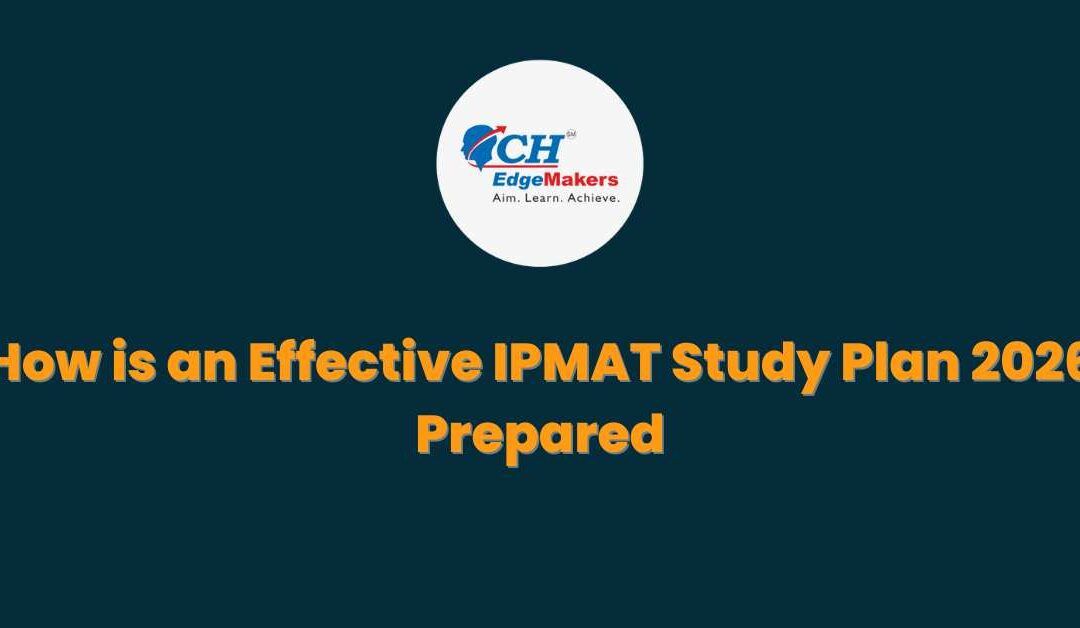IPMAT is one of the most prestigious entrance exams for students aiming to pursue the five-year Integrated Program in Management at top institutes like IIM Indore and IIM Rohtak. Given the tough competition, having an Effective IPMAT Study Plan 2026 is essential to stay ahead and maximize your chances of success. If you are committed to cracking IPMAT 2026, this article will guide you through the process of building a strategic and result-oriented study plan tailored for the exam.
Understanding the Pattern of IPMAT Exam
As a prerequisite to establishing a study plan, one needs to understand the pattern of the IPMAT exam. The exam consists of three sections in particular:
Quantitative Ability (MCQs) – Tests mathematical as well as numerical ability to solve problems.
Quantitative Ability (Short Answers) – Test right written answers without options.
Verbal Ability (MCQs) – Test English language skill on reading comprehension, grammar, and vocabulary.
IIM Rohtak’s IPMAT is slightly variant in that it replaces Logical Reasoning with Short Answer.
Marking Scheme
- 4 marks for each correct answer.
- 1 mark penalty for each wrong answer.
- Blanks on unattempted questions do not attract any penalty.
Learning these will enable you to schedule and plan your work to best advantage.
Step-by-Step Instructions to Write an IPMAT Study Plan
Step 1: Know Your Strengths and Weaknesses
Take the sit-down test yourself so that you will be aware about your strength and weakness in Quantitative Ability and Verbal Ability. It will guide you to prepare a list of topics on which you have to work seriously. Note down subjects on which you get most stuck and give more time to them in your study schedule.
Step 2: Set Realistic Goals
Divide your preparation into realistic goals:
- Short-term objectives (if you have weekly objectives like completion of a chapter, solving a collection of exams of some size of questions, etc.)
- Medium-term objectives (if you have month-wise objectives like completion of Quantitative Ability course, accuracy improvement, etc.)
- Long-term objectives (once for overall revision, solving a set of full-length mock tests)
By creating measurable and reasonable goals, you will know how to follow the progress and remain motivated for the preparation process.
Step 3: Time Table a Daily Study
- Time table your daily study so that you get discipline. Below is an example time table for studying:
- Morning (2-3 hours): Quantitative Ability (Concept building and problem solving)
- Afternoon (1-2 hours): Verbal Ability (Reading Comprehension, Grammar, Vocabulary)
- Evening (1-2 hours): Sectional tests and practice questions
- Weekend: Mock test and performance analysis
Consistency is the “mantra”. Follow your regimen and then in turn, change accordingly to complete the weak portions.
Step 4: Rock Quantitative Ability
Quantitative Ability is one of the super strong areas of the test, and conceptually it takes extremely strong build-ups. Prior areas are:
- Arithmetic (Percentages, Profit & Loss, Ratio & Proportion, Simple & Compound Interest)
- Algebra (Equations, Polynomials, Inequalities, Functions)
- Number System (Divisibility Rules, LCM & HCF, Remainders)
- Geometry and Mensuration (Triangles, Circles, Coordinate Geometry, Volume & Surface Area)
- Probability and Permutations & Combinations
- Data Interpretation (Pie Charts, Tables, Graphs, Line Charts)
Some tips to master Quantitative Ability:
- Complete your basics and then attempt hard questions.
- Have a formula book handy for quick revision.
- Attempt mixed questions from various sources.
- Practice mental calculations to save time during the test.
Step 5: Improve Verbal Ability
The Verbal Ability section is to test your English ability such as comprehension, grammar, and vocabulary. Important areas of concern are:
- Reading Comprehension (Inference-based, Fact-based, Tone-based questions)
- Grammar (Parts of Speech, Sentence Correction, Articles, Prepositions, Tenses)
- Vocabulary (Phrasal Verbs, Analogies, Idioms, Antonyms, Synonyms)
- Para Jumbles and Fill in the Blanks
- Sentence Completion and Error Spotting
Some Verbal Ability tips:
- Read daily newspapers, novels, and magazines.
- Practice at least 2-3 Reading Comprehension passages a day.
- Learn to master 5-10 words per day and apply them in a sentence.
- Perform sectional tests to learn well.
- Practice context knowledge rather than mugging up.
- Register Login
Step 6: Logical Reasoning (For IIM Rohtak IPMAT Aspirants)
Logical Reasoning is an independent section for IIM Rohtak’s IPMAT aspirants. Important topics are:
- Coding-Decoding
- Syllogisms
- Blood Relations
- Seating Arrangement
- Direction Sense
- Series and Sequences
The most important thing to learn Logical Reasoning is repetition. Practice at least 10-15 logical reasoning questions on a daily basis.
Step 7: Practice Mock Tests and Assess Performance
Mock tests are your practice. Practice at least a mock test a week to begin with and continue increasing more as the exam date approaches.
- How to Study Mock Tests Properly?
- Find weak points and practice them.
- Check accuracy and speed.
- Trained from mistakes to not make the same mistake on the final test.
- Use standard test-taking techniques (i.e., avoiding writing out complete answers, taking right questions, etc.)
Step 8: Routine Revision
Revision is memorization. Carve out a little time each day to review basics, formulae, and vocabulary. Have a revision planner, reviewing vital concepts on a weekly basis.
Step 9: Be Regular and Motivated
- Create a routine but still be flexible.
- Keep taking regular breaks to not burn out.
- Stay positive and confident.
- Discuss with fellow students in study groups to stay motivated and exchange information.
- Last 30-Day Study Plan for IPMAT 2026
| Week | Quant basics + Verbal RC |
| Week | Practice Quant + Grammar at higher level |
| Week | Practice 3-4 mock tests + rectify errors |
| Week | Practice full-length mocks + Final proofreading |
Conclusion
Cracking IPMAT is only possible with a persistent and systematic approach. Holding on to the trend of the test, making realistic targets for yourself, adhering to a well-planned study schedule, and regular practice through mock tests will surely bring success your way. Practice sincerely, practice regularly, and believe in yourself. Good luck for IPMAT 2026 preparation!

